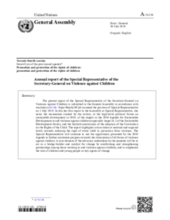Summary
The present report of the Special Representative of the Secretary-General on Violence against Children is submitted to the General Assembly in accordance with resolution 64/146. Najat Maalla M’jid assumed the position of Special Representative on 1 July 2019. In this her first report to the Assembly as Special Representative, she notes the momentum created by the review, at the high-level political forum on sustainable development in 2019, of the targets in the 2030 Agenda for Sustainable Development to end violence against children (especially target 16.2 of the Sustainable Development Goals), and the thirtieth anniversary of the adoption of the Convention on the Rights of the Child. The report highlights action taken at national and regional levels towards realizing the right of every child to protection from violence. The Special Representative will continue to use the opportunity presented by the 2030 Agenda to further accelerate progress towards the elimination of all forms of violence against children. A core element of the advocacy undertaken by the mandate will be to act as a bridge-builder and catalyst for change by establishing and strengthening partnerships among those working to end violence against children, and to emphasize the role of children and young people as key agents of change.
Examples of efforts made to address violence against children as it relates to children's care include:
"37. In Iraq, a national child protection policy is being developed to improve the situation of children, including children in conflict with the law, and to end violence and ill-treatment, child labour and violence in institutions."
Other sections relevant to children's care include:
"55. Measures to uphold justice are particularly important for children held in detention, who are vulnerable to violent and degrading treatment throughout the criminal justice process. It is vital to prevent deprivation of liberty and to provide non-custodial alternatives for children’s care, support and reintegration."
"60. The rights of children to protection from violence continue when they are on the move as refugees or migrants and it is essential that they have access to social services, including ensuring the appointment of a guardian, and ending the detention that heightens the risk of abuse and exploitation."
"92. The mid-term review of the Regional Plan of Action was published in July 2019 and highlights the commitment of ASEAN member States to address violence against children. It documents progress made by member States in the priority areas of the plan, including the introduction of legislation to strengthen the protection of children, increasing the use of alternative measures to judicial proceedings and detention, the use of family-based alternatives to the institutionalization of children in need of care, and promoting non-violent approaches to parenting."
"104. Recognizing the humanitarian crisis faced by migration flows in Latin America, the Montevideo Declaration includes a strong call to ensure the best interests of the child and the safeguarding of the rights of children on the move in the region. Attention was given to the migration flows from Venezuela (Bolivarian Republic of) to other countries in South America. The Declaration calls for the urgent need to address the driving causes of migration; the obligation to keep families together; ensuring special protection of children, including by not placing children in detention; and ensuring the effective response of national child protection systems. In line with the Global Compact for Migration, these actions need to be supported by bilateral, regional and multilateral cooperation. In this regard, the office of the Special Representative participated in meetings with civil society organizations, Governments and international organizations working for children on the move in South America and since then has continued dialogue with key allies in the region to support the safeguarding of the rights of children on the move in the Americas."
"105. A regional meeting with civil society to inform the global study on children deprived of their liberty was hosted by Uruguay. The office of the Special Representative presented the preliminary findings of its forthcoming report entitled “Children in Latin America speak about the impact of deprivation of liberty”, which captures both qualitative and quantitative data on children affected by deprivation of liberty in justice institutions in Paraguay and Uruguay, and children of incarcerated parents in Latin America. One key finding is the link between violence and deprivation of liberty and the negative and long-lasting impact that deprivation of liberty has on children’s lives. Children affected by deprivation of liberty call for strong political commitment and investment to prevent both deprivation of liberty and violence against children."

